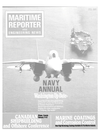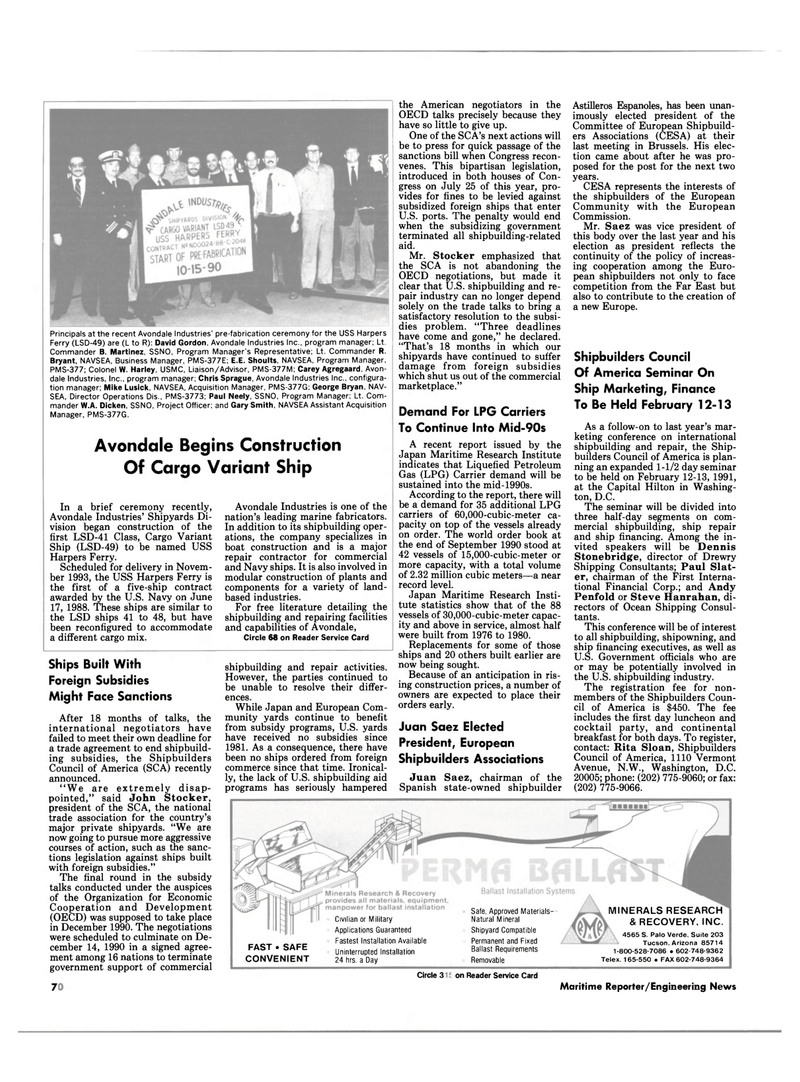
Page 3rd Cover: of Maritime Reporter Magazine (February 1991)
Read this page in Pdf, Flash or Html5 edition of February 1991 Maritime Reporter Magazine
Principals at the recent Avondale Industries' pre-fabrication ceremony for the USS Harpers
Ferry (LSD-49) are (L to R): David Gordon. Avondale Industries Inc., program manager; Lt.
Commander B. Martinez, SSNO, Program Manager's Representative; Lt. Commander R.
Bryant, NAVSEA, Business Manager, PMS-377E; E.E. Shoults, NAVSEA, Program Manager.
PMS-377; Colonel W. Harley, USMC, Liaison/Advisor, PMS-377M; Carey Agregaard. Avon- dale Industries, Inc., program manager; Chris Sprague, Avondale Industries Inc., configura- tion manager; Mike Lusick, NAVSEA, Acquisition Manager, PMS-377G; George Bryan. NAV-
SEA, Director Operations Dis., PMS-3773; Paul Neely, SSNO, Program Manager; Lt. Com- mander W.A. Dicken, SSNO, Project Officer; and Gary Smith, NAVSEA Assistant Acquisition
Manager, PMS-377G.
Avondale Begins Construction
Of Cargo Variant Ship
In a brief ceremony recently,
Avondale Industries' Shipyards Di- vision began construction of the first LSD-41 Class, Cargo Variant
Ship (LSD-49) to be named USS
Harpers Ferry.
Scheduled for delivery in Novem- ber 1993, the USS Harpers Ferry is the first of a five-ship contract awarded by the U.S. Navy on June 17, 1988. These ships are similar to the LSD ships 41 to 48, but have been reconfigured to accommodate a different cargo mix.
Avondale Industries is one of the nation's leading marine fabricators.
In addition to its shipbuilding oper- ations, the company specializes in boat construction and is a major repair contractor for commercial and Navy ships. It is also involved in modular construction of plants and components for a variety of land- based industries.
For free literature detailing the shipbuilding and repairing facilities and capabilities of Avondale,
Circle 68 on Reader Service Card
Ships Built With
Foreign Subsidies
Might Face Sanctions
After 18 months of talks, the international negotiators have failed to meet their own deadline for a trade agreement to end shipbuild- ing subsidies, the Shipbuilders
Council of America (SCA) recently announced. "We are extremely disap- pointed," said John Stocker, president of the SCA, the national trade association for the country's major private shipyards. "We are now going to pursue more aggressive courses of action, such as the sanc- tions legislation against ships built with foreign subsidies."
The final round in the subsidy talks conducted under the auspices of the Organization for Economic
Cooperation and Development (OECD) was supposed to take place in December 1990. The negotiations were scheduled to culminate on De- cember 14, 1990 in a signed agree- ment among 16 nations to terminate government support of commercial 74 shipbuilding and repair activities.
However, the parties continued to be unable to resolve their differ- ences.
While Japan and European Com- munity yards continue to benefit from subsidy programs, U.S. yards have received no subsidies since 1981. As a consequence, there have been no ships ordered from foreign commerce since that time. Ironical- ly, the lack of U.S. shipbuilding aid programs has seriously hampered the American negotiators in the
OECD talks precisely because they have so little to give up.
One of the SCA's next actions will be to press for quick passage of the sanctions bill when Congress recon- venes. This bipartisan legislation, introduced in both houses of Con- gress on July 25 of this year, pro- vides for fines to be levied against subsidized foreign ships that enter
U.S. ports. The penalty would end when the subsidizing government terminated all shipbuilding-related aid.
Mr. Stocker emphasized that the SCA is not abandoning the
OECD negotiations, but made it clear that U.S. shipbuilding and re- pair industry can no longer depend solely on the trade talks to bring a satisfactory resolution to the subsi- dies problem. "Three deadlines have come and gone," he declared. "That's 18 months in which our shipyards have continued to suffer damage from foreign subsidies which shut us out of the commercial marketplace."
Demand For LPG Carriers
To Continue Into Mid-90s
A recent report issued by the
Japan Maritime Research Institute indicates that Liquefied Petroleum
Gas (LPG) Carrier demand will be sustained into the mid-1990s.
According to the report, there will be a demand for 35 additional LPG carriers of 60,000-cubic-meter ca- pacity on top of the vessels already on order. The world order book at the end of September 1990 stood at 42 vessels of 15,000-cubic-meter or more capacity, with a total volume of 2.32 million cubic meters—a near record level.
Japan Maritime Research Insti- tute statistics show that of the 88 vessels of 30,000-cubic-meter capac- ity and above in service, almost half were built from 1976 to 1980.
Replacements for some of those ships and 20 others built earlier are now being sought.
Because of an anticipation in ris- ing construction prices, a number of owners are expected to place their orders early.
Juan Saez Elected
President, European
Shipbuilders Associations
Juan Saez, chairman of the
Spanish state-owned shipbuilder
Astilleros Espanoles, has been unan- imously elected president of the
Committee of European Shipbuild- ers Associations (CESA) at their last meeting in Brussels. His elec- tion came about after he was pro- posed for the post for the next two years.
CESA represents the interests of the shipbuilders of the European
Community with the European
Commission.
Mr. Saez was vice president of this body over the last year and his election as president reflects the continuity of the policy of increas- ing cooperation among the Euro- pean shipbuilders not only to face competition from the Far East but also to contribute to the creation of a new Europe.
Shipbuilders Council
Of America Seminar On
Ship Marketing, Finance
To Be Held February 12-13
As a follow-on to last year's mar- keting conference on international shipbuilding and repair, the Ship- builders Council of America is plan- ning an expanded 1-1/2 day seminar to be held on February 12-13, 1991, at the Capital Hilton in Washing- ton, D.C.
The seminar will be divided into three half-day segments on com- mercial shipbuilding, ship repair and ship financing. Among the in- vited speakers will be Dennis
Stonebridge, director of Drewry
Shipping Consultants; Paul Slat- er, chairman of the First Interna- tional Financial Corp.; and Andy
Penfold or Steve Hanrahan, di- rectors of Ocean Shipping Consul- tants.
This conference will be of interest to all shipbuilding, shipowning, and ship financing executives, as well as
U.S. Government officials who are or may be potentially involved in the U.S. shipbuilding industry.
The registration fee for non- members of the Shipbuilders Coun- cil of America is $450. The fee includes the first day luncheon and cocktail party, and continental breakfast for both days. To register, contact: Rita Sloan, Shipbuilders
Council of America, 1110 Vermont
Avenue, N.W., Washington, D.C. 20005; phone: (202) 775-9060; or fax: (202) 775-9066.
FAST • SAFE
CONVENIENT
Civilian or Military
Applications Guaranteed
Fastest Installation Available
Uninterrupted Installation 24 hrs. a Day
Safe, Approved Materials-
Natural Mineral
Shipyard Compatible
Permanent and Fixed
Ballast Requirements
Removable
MINERALS RESEARCH & RECOVERY, INC. 4565 S. Palo Verde, Suite 203
Tucson, Arizona 85714 1-800-528-7086 . 602-748-9362
Telex. 165-550 . FAX 602-748-9364
Circle 332 on Reader Service Card
Maritime Reporter/Engineering News

 69
69

 4th Cover
4th Cover
